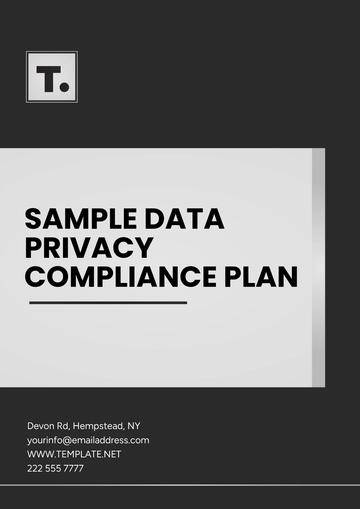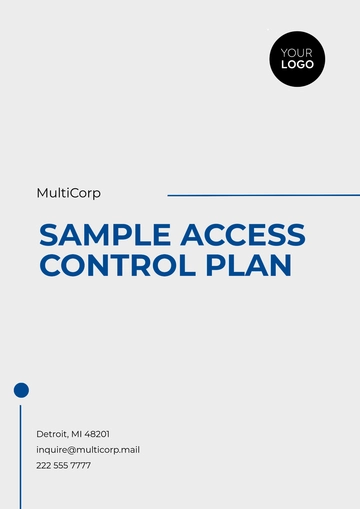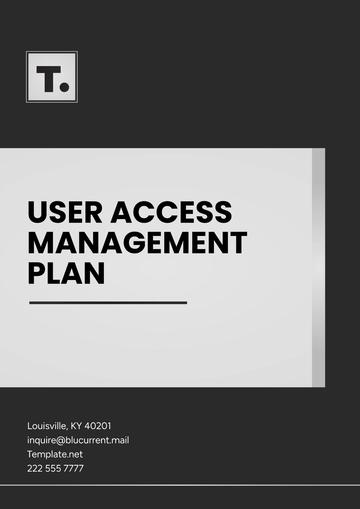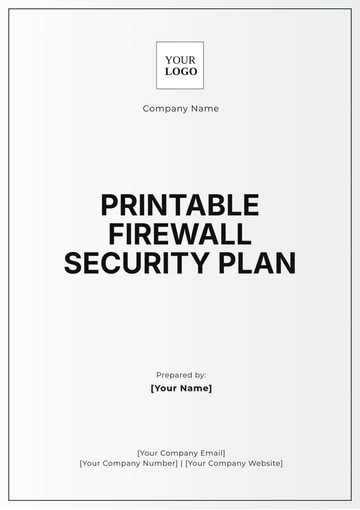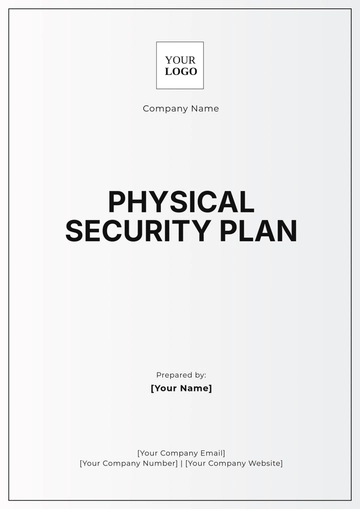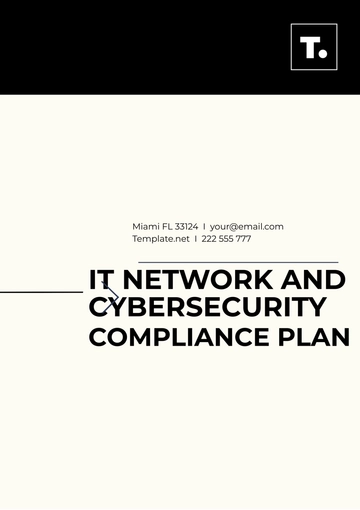Free Car Rental Security Plan

I. Introduction
Our Car Rental Security Plan is designed to ensure the safety and security of our customers, employees, vehicles, and facilities. This comprehensive plan outlines the measures we will implement to protect against physical and cyber threats, manage incidents effectively, and maintain compliance with relevant regulations. The scope of this plan includes all aspects of our operations, from physical security measures at our facilities to the cybersecurity protocols safeguarding our data.
II. Roles and Responsibilities
A. Management
Management is responsible for overseeing the implementation and continuous improvement of the security plan. This includes allocating necessary resources, ensuring compliance with security policies, and conducting regular reviews and audits of security practices. Management also plays a key role in fostering a culture of security awareness throughout the organization.
B. Security Personnel
Security personnel are tasked with the day-to-day implementation of physical security measures, monitoring surveillance systems, and responding to security incidents. They are also responsible for conducting regular patrols of the premises, managing access control systems, and coordinating with local law enforcement when necessary.
C. Rental Agent
Rental agents are responsible for implementing security measures during the rental process, including verifying customer identities, securing payment information, and ensuring vehicles are returned in good condition. They must also report any suspicious activity or security incidents to the appropriate personnel.
D. Customer
Customers are expected to adhere to the terms and conditions of the rental agreement, including reporting any damage or security incidents involving the rental vehicle. They should also take reasonable precautions to protect the vehicle from theft or damage while it is in their possession.
III. Physical Security Measures
A. Facility Security
Our facilities will be equipped with various security measures to ensure the safety of our premises and vehicles. Planned measures include:
Perimeter fencing to prevent unauthorized access.
Adequate lighting around the facility to deter criminal activity.
Surveillance cameras strategically placed to monitor all areas of the facility.
Alarm systems to alert security personnel in case of a breach.
B. Vehicle Storage Security
Vehicles will be stored in secured areas to prevent theft or vandalism. Planned measures include:
Secured lots with locked gates and restricted access.
Alarm systems on gates to detect unauthorized entry.
Regular patrols by security personnel to monitor vehicle storage areas.
Use of GPS tracking systems to monitor the location of vehicles.
C. Key Control
Key control measures are essential to prevent unauthorized access to our vehicles. Planned measures include:
A secure key management system to track the issuance and return of keys.
Duplication prevention measures to ensure keys cannot be copied without authorization.
Implementation of electronic key systems to enhance security.
Regular audits of key inventory to ensure accountability.
D. Access Control
Access control measures will be implemented to manage entry and exit from our facilities. Planned measures include:
Strict entry and exit procedures for employees and visitors.
Use of ID badges to verify the identity of personnel accessing secure areas.
Maintenance of visitor logs to track individuals entering and leaving the facility.
Controlled access to sensitive areas, such as offices and storage rooms.
IV. Cybersecurity Measures
A. Data Protection
Data protection measures will safeguard customer and organizational data from unauthorized access and breaches. Planned measures include:
Encryption of sensitive data both in transit and at rest.
Secure storage solutions to protect data from physical and cyber threats.
Implementation of access controls to limit data access to authorized personnel only.
Regular data backups to ensure data recovery in case of loss or breach.
B. Network Security
Network security measures will protect our IT infrastructure from cyber attacks. Planned measures include:
Firewalls to prevent unauthorized access to our network.
Intrusion detection systems to monitor and respond to suspicious activity.
Regular updates and patches to software and hardware to address vulnerabilities.
Network segmentation to limit the spread of potential breaches.
C. Employee Training
Employee training is crucial to ensure all staff are aware of and can implement security measures. Planned measures include:
Regular training sessions on phishing prevention and secure password practices.
Workshops on recognizing and reporting suspicious activity.
Training on the proper use of security systems and protocols.
Mandatory security awareness training for all new employees during orientation.
D. Incident Response Plan
An incident response plan will be established to effectively manage and mitigate security incidents. Planned measures include:
Clear reporting procedures for employees to report security incidents.
Formation of a dedicated response team to handle security breaches.
Detailed steps for containment, eradication, and recovery from security incidents.
Post-incident analysis to identify causes and implement preventive measures.
V. Rental Process Security
A. Identity Verification
To ensure the legitimacy of our customers and prevent fraudulent activities, we will implement stringent identity verification measures. Planned measures include:
Requiring valid government-issued photo identification from all customers.
Verifying customer identity through additional documents, such as utility bills or credit card statements.
Using electronic identity verification systems to cross-check provided information.
Conducting random checks to ensure compliance with identity verification procedures.
B. Payment Security
We are committed to securing payment transactions and protecting customer financial information. Planned measures include:
Implementing secure payment processing systems that comply with PCI DSS standards.
Using encryption technology to protect payment data during transactions.
Employing fraud detection systems to identify and prevent suspicious activities.
Regularly auditing payment systems to ensure security measures are up to date.
C. Vehicle Tracking
To enhance the security of our vehicles and ensure customer safety, we will implement vehicle tracking measures. Planned measures include:
Installing GPS tracking devices in all rental vehicles.
Using geofencing technology to receive alerts if a vehicle leaves a predefined area.
Monitoring vehicle locations in real-time to provide assistance in case of emergencies.
Implementing protocols for the recovery of stolen vehicles using tracking data.
D. Rental Agreement Safeguards
Our rental agreements will include safeguards to protect both the customer and our organization. Planned measures include:
Clearly outlining terms and conditions, including responsibilities and liabilities.
Including clauses that specify penalties for late returns, damages, and violations of terms.
Requiring customer signatures to acknowledge understanding and acceptance of the agreement.
Regularly reviewing and updating rental agreements to address emerging risks and legal requirements.
VI. Incident Management
A. Reporting Incidents
Prompt and accurate reporting of security incidents is crucial for effective incident management. Planned measures include:
Establishing clear channels for employees and customers to report security incidents.
Providing detailed guidelines on the information to include in incident reports.
Implementing a centralized system to log and track reported incidents.
Encouraging a culture of transparency and prompt reporting among employees.
B. Incident Response Procedures
A structured process will be followed to manage and mitigate security incidents. The process includes:
Identification: Detect and confirm the occurrence of a security incident.
Containment: Implement measures to limit the impact of the incident.
Eradication: Identify and eliminate the root cause of the incident.
Recovery: Restore affected systems and processes to normal operation.
Post-Incident Analysis: Review the incident to identify lessons learned and improve future responses.
C. Communication Protocols
Effective communication is essential during and after a security incident. Planned protocols include:
Notifying relevant internal stakeholders immediately upon incident detection.
Communicating with affected customers to provide timely updates and assistance.
Coordinating with external parties, such as law enforcement and regulatory bodies, as needed.
Ensuring consistent and clear messaging to maintain trust and transparency.
VII. Employee Security Policies
A. Background Checks
All potential employees will undergo thorough background checks to ensure they meet our security standards. This policy includes:
Conducting criminal background checks to identify any past offenses.
Verifying employment history and references to assess candidate reliability.
Checking for any history of fraudulent activities or security breaches.
Reassessing employee backgrounds periodically to maintain security integrity.
B. Security Training
Comprehensive security training will be provided to all employees to ensure they are equipped to handle security challenges. This policy includes:
Mandatory security orientation for all new employees.
Regular refresher courses to keep employees updated on security best practices.
Specialized training for roles with specific security responsibilities.
Assessing employee understanding and compliance through periodic evaluations.
C. Code of Conduct
Our code of conduct will outline the expected behavior and ethical standards for all employees. This policy includes:
Clearly defining acceptable and unacceptable behaviors.
Emphasizing the importance of confidentiality and data protection.
Encouraging employees to report violations of the code of conduct.
Providing guidelines for appropriate use of company resources and systems.
D. Disciplinary Actions
To enforce compliance with security policies, a structured disciplinary process will be implemented. The table below outlines progressive consequences for violations:
Violation Type | First Offense | Second Offense | Third Offense |
|---|---|---|---|
Minor Violation | Verbal Warning | Written Warning | Suspension |
Moderate Violation | Written Warning | Suspension | Termination |
Severe Violation | Suspension | Termination | N/A |
Gross Misconduct | Termination | N/A | N/A |
VIII. Compliance and Auditing
We will adhere to all relevant US standards and regulations to ensure our security practices meet legal and industry requirements. Relevant standards include:
Federal Trade Commission (FTC) guidelines on data protection.
Payment Card Industry Data Security Standard (PCI DSS) for payment processing.
Occupational Safety and Health Administration (OSHA) standards for workplace safety.
National Institute of Standards and Technology (NIST) cybersecurity framework.
Local and state regulations governing vehicle rental operations and data privacy.
IX. Review and Updates
Our Car Rental Security Plan will be reviewed regularly to ensure it remains effective and up to date with evolving security threats and regulatory requirements. Updates will occur:
Annually, as part of our routine review process.
After any significant security incident, to incorporate lessons learned.
When there are changes in relevant laws or industry standards.
Based on feedback from security audits and employee input.
- 100% Customizable, free editor
- Access 1 Million+ Templates, photo’s & graphics
- Download or share as a template
- Click and replace photos, graphics, text, backgrounds
- Resize, crop, AI write & more
- Access advanced editor
Explore the Car Rental Security Plan Template on Template.net. This customizable template offers comprehensive security strategies tailored to car rental operations. Ensure safety with detailed protocols for facility and vehicle security, all editable in our AI Editor tool. Protect assets and enhance operational resilience with ease.
You may also like
- Finance Plan
- Construction Plan
- Sales Plan
- Development Plan
- Career Plan
- Budget Plan
- HR Plan
- Education Plan
- Transition Plan
- Work Plan
- Training Plan
- Communication Plan
- Operation Plan
- Health And Safety Plan
- Strategy Plan
- Professional Development Plan
- Advertising Plan
- Risk Management Plan
- Restaurant Plan
- School Plan
- Nursing Home Patient Care Plan
- Nursing Care Plan
- Plan Event
- Startup Plan
- Social Media Plan
- Staffing Plan
- Annual Plan
- Content Plan
- Payment Plan
- Implementation Plan
- Hotel Plan
- Workout Plan
- Accounting Plan
- Campaign Plan
- Essay Plan
- 30 60 90 Day Plan
- Research Plan
- Recruitment Plan
- 90 Day Plan
- Quarterly Plan
- Emergency Plan
- 5 Year Plan
- Gym Plan
- Personal Plan
- IT and Software Plan
- Treatment Plan
- Real Estate Plan
- Law Firm Plan
- Healthcare Plan
- Improvement Plan
- Media Plan
- 5 Year Business Plan
- Learning Plan
- Marketing Campaign Plan
- Travel Agency Plan
- Cleaning Services Plan
- Interior Design Plan
- Performance Plan
- PR Plan
- Birth Plan
- Life Plan
- SEO Plan
- Disaster Recovery Plan
- Continuity Plan
- Launch Plan
- Legal Plan
- Behavior Plan
- Performance Improvement Plan
- Salon Plan
- Security Plan
- Security Management Plan
- Employee Development Plan
- Quality Plan
- Service Improvement Plan
- Growth Plan
- Incident Response Plan
- Basketball Plan
- Emergency Action Plan
- Product Launch Plan
- Spa Plan
- Employee Training Plan
- Data Analysis Plan
- Employee Action Plan
- Territory Plan
- Audit Plan
- Classroom Plan
- Activity Plan
- Parenting Plan
- Care Plan
- Project Execution Plan
- Exercise Plan
- Internship Plan
- Software Development Plan
- Continuous Improvement Plan
- Leave Plan
- 90 Day Sales Plan
- Advertising Agency Plan
- Employee Transition Plan
- Smart Action Plan
- Workplace Safety Plan
- Behavior Change Plan
- Contingency Plan
- Continuity of Operations Plan
- Health Plan
- Quality Control Plan
- Self Plan
- Sports Development Plan
- Change Management Plan
- Ecommerce Plan
- Personal Financial Plan
- Process Improvement Plan
- 30-60-90 Day Sales Plan
- Crisis Management Plan
- Engagement Plan
- Execution Plan
- Pandemic Plan
- Quality Assurance Plan
- Service Continuity Plan
- Agile Project Plan
- Fundraising Plan
- Job Transition Plan
- Asset Maintenance Plan
- Maintenance Plan
- Software Test Plan
- Staff Training and Development Plan
- 3 Year Plan
- Brand Activation Plan
- Release Plan
- Resource Plan
- Risk Mitigation Plan
- Teacher Plan
- 30 60 90 Day Plan for New Manager
- Food Safety Plan
- Food Truck Plan
- Hiring Plan
- Quality Management Plan
- Wellness Plan
- Behavior Intervention Plan
- Bonus Plan
- Investment Plan
- Maternity Leave Plan
- Pandemic Response Plan
- Succession Planning
- Coaching Plan
- Configuration Management Plan
- Remote Work Plan
- Self Care Plan
- Teaching Plan
- 100-Day Plan
- HACCP Plan
- Student Plan
- Sustainability Plan
- 30 60 90 Day Plan for Interview
- Access Plan
- Site Specific Safety Plan
